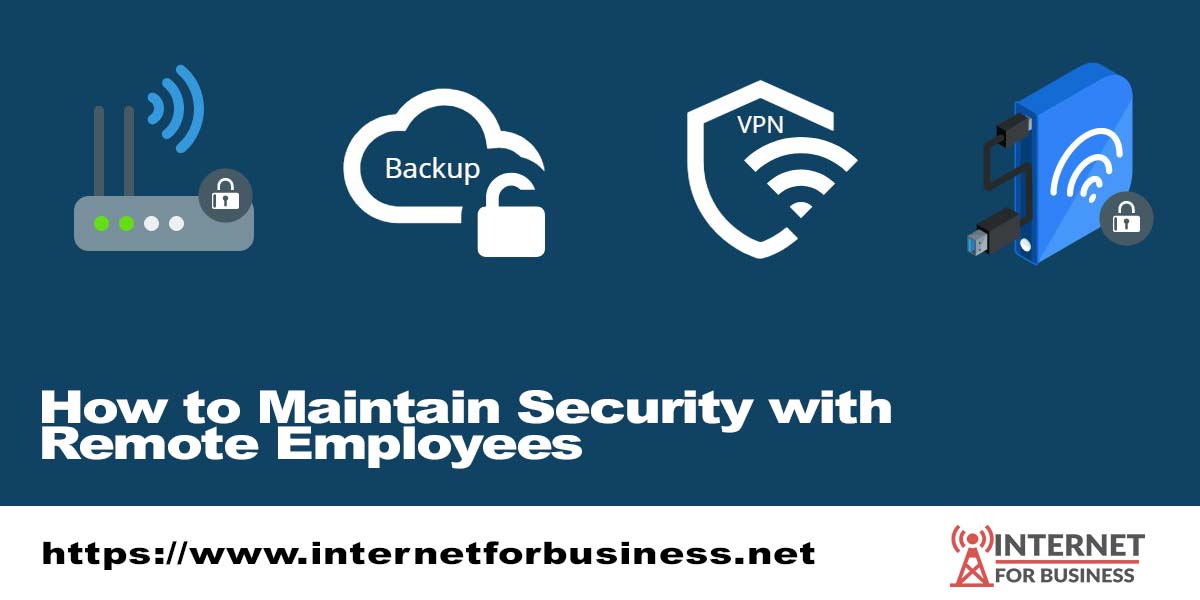How to Maintain Security with Remote Employees

Working remotely can improve productivity, comfort, and retention of employees. And with the CDC's advice of social distancing to avoid and delay the spread of COVID-19, millions of Americans are working from home. But how do you guarantee protection when workers are not on-site?
This post offers tips for developing a company security strategy that prevents the sensitive data of your company from being compromised.
Why You Need A Security Policy for Company
Remote work poses greater risks of revealing or falling into the wrong hands of details. The personal Wi-Fi networks of employees may not be as safe when working from home or have the same enterprise-level security features that they are used to at the workplace. And workers may opt to operate from places such as hotels or coffee shops while on the go. While this local transition can spark imagination and empower efficiency, it can warrant the use of unknown or unsecured networks by employees.
To access them, unsecured networks do not need authentication. It means that anyone can use the link and probably gain access to employee devices and, in turn, business data.
A security policy provides workers with defined guidelines, allowing them to be intelligent and secure while remotely accessing company data.
How an effective strategy can be built
Establish a security policy with detailed guidelines tailored to the unique security needs of your business. In order to ensure the health of the knowledge and systems of your company while workers are offsite, consider the following:
- Assess applications for antivirus and malware. Work with your IT team to determine whether the safety of software still aligns with the security needs of your company and inform employees of any changes.
- Use a virtual private network ( VPN) to allow employees to access data. This enables them to access sensitive information through a secure, encrypted link that essentially connects the device of a user to the corporate network as if they were physically present.
- To assess whether any malicious activity has been observed on your network, perform an annual checkup or cyber threat evaluation. Work with the IT team to decide the next best steps if suspicious behavior is detected.
- Establish a consistent chain of command in the event that computers are misplaced or stolen from employees. If computers fall into the wrong hands, notify workers about how to contact and educate them about best practices, such as changing passwords or wiping the computer.
- Ensure careful handling of settings. Double-checking the equipment used remotely by employees may support software upgrades and prevents unauthorized applications from being installed.
- Limit access to information about the company. Not every worker requires access to all company data. A veterinarian who needs access to specific records and details to prevent hackers from obtaining access to all information at once.
- Employees are expected to use multi-factor authentication and complex passwords that are hard to guess. Employees should always lock and never leave unattended devices and company-based applications which host or can gain access to company data.
Also Read: Internet 101 : How to Stay Safe Online

Your strategy should provide useful tips for protecting home networks if workers operate from home daily. For instance:
- Secure the Internet router in the house. The router is one of the most critical devices in home security, as it connects all the IoT devices of a home. The default service set identifier (SSID) and password to be started should be updated by employees.
- Regularly update your IoT phone. From the router and computers of a home to the smart assistants and doorbells, all can be hacked. Firmware updates are released frequently and workers should review all devices periodically for updates.
- Limit access to networks. Employees do not feel obligated to exchange Wi-Fi passwords with non-family members of maintenance staff, landscapers, or others. For visitors to the house, a guest network should be set up.
- Investing in reliable antivirus, anti-spyware, and firewall software is recommended. This would add an extra security layer to the home networks of employees.
Educate staff on the value of adhering to company security policies and regulations. Stresses the risk factors associated with accessing unsecured connections to data and information. Sensitive information or network access may fall into the wrong hands if security policies are not followed.
Related Articles:
CyberAttack: 7 Ways to Protect Your Small Business
Why Data Backup is Important for Growing Business
6 Ways to Improved Your Internet Speed in your Office
Related Posts
Fri, May 8, 2020 4:16 AM
Why should Businesses consider using live streaming
Video content has been having its prime for some time now. In 2019, an incredible 85% of organizations utilized video as a promoting device. Out of the advertisers who use video, 89% state video gives them a decent rate of return. With 72% of businesses that use video selecting explainer recordings, this arrangement is the most-made sort of video content.
Tue, May 19, 2020 12:52 AM
The Ultimate Guide to Small-Business Internet Plan
If you are decided to go for the business internet, the next move is to choose on the internet service provider and business internet plan. This process can be intimidating as deciding internet plan for your home. Here are steps to help you decide on business internet plans that suit your small business.
Wed, Jun 17, 2020 5:01 AM
Internet Marketing: Use the Power of the Internet to Grow Your Business!
In case you're serious about building your business. it's an ideal opportunity to take advantage of internet marketing. This system is significant on the grounds that it engages you to speak with customers an
Fri, Jun 26, 2020 5:04 AM
Is Frontier Internet Service Still Good? | Frontier Internet 2020 Review
Frontier Internet Service providers FiOS (Verizon FiOS), cable, DSL internet package, and Frontier TV. In selected areas, customers can have fiber optic internet connection with the speed up to 500 Mbps. You can choose a month to month contract or a two-year price lock guarantee.
Sat, Jun 27, 2020 4:36 AM
Windstream Internet Service: Availability, Plan, Pricing and More
Windstream Internet services are the 6th largest DSL provider in the United States. It provides internet service withing the 50 states in the country. Aside from DSL broadband, Windstream also offers cable, fixed wireless, and copper Internet service. They are the 7th largest fiber broadband provider in the US with an estimated 1.7 million users.




